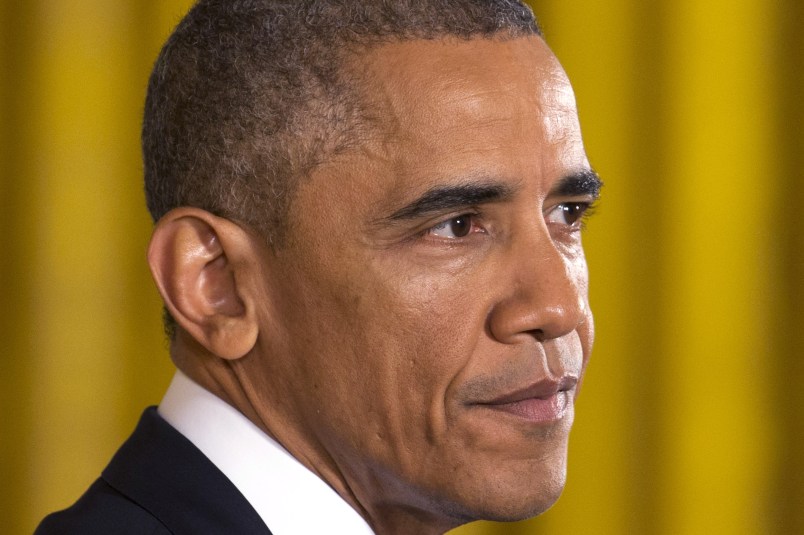The Supreme Court’s surprising decision on Friday to take a case aimed at invalidating federal Obamacare subsidies for millions of Americans foreshadows troubling news for the health care law, legal experts say.
The justices’ move to hear King v. Burwell came before a hearing next month in the D.C. Circuit Court of Appeals, which vacated a three-judge panel’s July ruling against the subsidies and decided to review the case en banc. Two trial court judges and the 4th Circuit Court of Appeals upheld the subsidies, so there was no ongoing split in the circuit courts.
“I’m just stunned. I can’t remember a time when a case was granted when there was a re-hearing pending in a circuit court,” said Lucas A. Powe Jr., a Supreme Court historian at the University of Texas, Austin.
At issue is whether the language of the Obamacare statute restricts the premium tax credits to residents buying insurance from a state-run exchange, and prohibits the subsidies on the federal exchange which serves some 7 million Americans in 36 states. A ruling against the White House would blow a huge hole in Obamacare because the subsidies are critical to ensuring that lower-income Americans can afford insurance.
What’s atypical here is that the Supreme Court granted the case in the absence of a circuit split or an unresolved constitutional question. But some legal experts argue that the Court’s move is valid under its rules, which let the justices take a case if it raises “an important question of federal law that has not been, but should be, settled by this Court.”
“I don’t think this is all that unusual,” said Nicholas Bagley, a law professor at the University of Michigan, who is skeptical of the lawsuit. “The court is empowered to hear cases of exceptional importance that need to be decided.”
What’s more troubling for the Obama administration are the plausible reasons for taking the case at this time. Some legal scholars interpret it as a sign that at least four justices — the number required to take a case — believe the 4th Circuit Court of Appeals made the wrong decision by upholding the Obamacare subsidies.
“It surprised me. I think it’s a sign that they’re probably going to reverse the 4th Circuit,” said Vanderbilt law professor Brian Fitzpatrick, a former clerk for Justice Antonin Scalia. “Because they didn’t see any reason to wait for the en banc proceedings at the DC Circuit to resolve themselves. So I think that at least four justices believe at least five justices are pretty inclined to strike down the subsidies on the federally run exchanges as a violation of statute.”
“I don’t think the four would rush to take this unless they thought there was a fifth vote [to overturn the Obamacare subsidies]. I don’t see why you’d go out of your way to take this case unless you thought it was going to be reversed,” he said.
Bagley similarly argued that there’s not much of a compelling reason for justices to take the case at this stage unless they want to ax the subsidies.
“If you think the 4th Circuit got it wrong, that’s a pretty powerful reason to take the case now and correct it, and not wait a couple of years,” he said.
That doesn’t necessarily spell doom for Obamacare, though. Yale law professor Abbe R. Gluck pointed out that justices sometimes supply votes to take a case out of collegiality when there are two or three justices who feel strongly about it. That may not translate into voting with them on the merits.
But she said the decision to take the case still raises troubling questions.
“I think that it raises the prospect that this case is going to be decided as a matter of politics and not as a matter of law,” Gluck said. “And that’s extremely problematic. The D.C. Circuit rarely grants cases en banc. It would’ve been productive to get their view on the case. That’s what the whole circuit process is for, to let arguments percolate either way on a case.”
Fitzpatrick said it’s still a tough case for the plaintiffs. “The government has the much easier side of the argument here. All the government has to do is prove the statute is ambiguous,” he said. If the justices are convinced the statute is ambiguous, longstanding legal precedent suggests they would grant deference to the agency that is implementing the law.
The expected outcome is that the Supreme Court hears the case next March and is expected to deliver a ruling by the end of June. The 4th Circuit case is King v. Burwell; the D.C. Circuit case is Halbig v. Burwell.







Very handsome picture of the President.
I am so disgusted with this country and the lazy electorate not interested in voting yet complaining about all that is wrong.
All the more reason for Pres. Obama to dig his heel into McConnell’s adam’s apple and never let up.
The hackiest SCOTUS in history was waiting for a Republican congressional majority to maximize the FUBAR.
Ginnie’s whispering into Clarence’s ear as we speak.
Any outside chance the liberal justices asked for the review to stem the lawsuits in the lower courts?